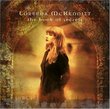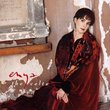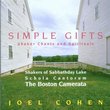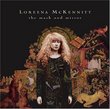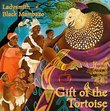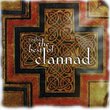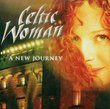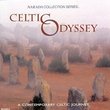| All Artists: Richard Souther, Emily van Evera, Sister Germaine Fritz Title: Vision: The Music of Hildegard von Bingen Members Wishing: 0 Total Copies: 6 Label: Angel Records Original Release Date: 11/1/1994 Release Date: 11/1/1994 Genres: Pop, Classical Styles: Vocal Pop, Opera & Classical Vocal, Historical Periods, Early Music, Modern, 20th, & 21st Century Number of Discs: 1 SwapaCD Credits: 1 UPCs: 724355524621, 724355524645 |
Search - Richard Souther, Emily van Evera, Sister Germaine Fritz :: Vision: The Music of Hildegard von Bingen
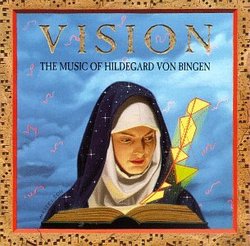 | Richard Souther, Emily van Evera, Sister Germaine Fritz Vision: The Music of Hildegard von Bingen Genres: Pop, Classical
"Vision--The Music of Hildegard von Bingen"? Make that "Hildegard--the Dance Remix." (Yes, it has been used on the dance floor of at least one New York City nightclub.) What else can you call it when Richard Souther tak... more » ![header=[] body=[This CD is available to be requested as disc only.]](/images/attributes/disc.png?v=430e6b0a) ![header=[] body=[This CD is available to be requested with the disc and back insert.]](/images/attributes/disc_back.png?v=430e6b0a) ![header=[] body=[This CD is available to be requested with the disc and front insert.]](/images/attributes/disc_front.png?v=430e6b0a) ![header=[] body=[This CD is available to be requested with the disc, front and back inserts.]](/images/attributes/disc_front_back.png?v=430e6b0a) |
Larger Image |
CD DetailsSynopsis
Amazon.com "Vision--The Music of Hildegard von Bingen"? Make that "Hildegard--the Dance Remix." (Yes, it has been used on the dance floor of at least one New York City nightclub.) What else can you call it when Richard Souther takes the stark, ecstatic plainchant of the 12th-century abbess and adds heavily produced electronic trance-and-dance tracks? Souther's additions aren't bad in themselves--they are a bit New Age-y, yet danceable in a druggy 3:00-a.m. kind of way--but slather them over Hildegard's spare, intense chant melodies and the effect is perverse, if not just silly. Don't blame poor Emily van Evera--she is a fine interpreter of Hildegard, and EMI simply asked her to record some unaccompanied solo tracks of the abbess's music and send in the tapes; she had no idea what was going to be done with them until this disc came out with her name on it. This shows up in the final product: the gently fluid pulse van Evera applied to Hildegard's music (which would make perfect sense in the a cappella performance she thought she was giving) feels completely disconnected from the rigid rhythms inherent in Souther's electronic accompaniment. Now, there are a number of customer reviews, below, from listeners who like this title a great deal--have a look at them, check out the sound clips, and by all means get this title if you're interested. But, if you're curious about Hildegard, go to the recording that made her famous eight centuries after her death: A Feather on the Breath of God. --Matthew Westphal Similarly Requested CDs
|
Member CD ReviewsReviewed on 6/17/2011... I think this CD is worth getting. Though it makes me want to hear the voice in its full without the musical accompaniment, I think it will make that more exciting. I think the music is subtle enough to not overpower the grace of the voice for the most part and its a whimsical listen! enchanting! 1 of 1 member(s) found this review helpful.
CD ReviewsFascinating modern adaptation of Hildegard E. Walters | UK | 10/22/2005 (5 out of 5 stars) "I found the below review from the UK amazon site extremely helpful. "Hildegard's music can be performed in many different ways. There's the 'purist' approach, that seeks to use top-class vocalists such as Emma Kirkby ('Gothic Voices') - who isn't on this album - in arrangements that come as close to the original as possible. The problem is, we simply don't know how the music really sounded when Hildegard wrote it. If you're a specialist, you'll already know why that is. But if you're not, it's all to do with the problems of interpreting the original manuscripts, and guesswork about what instrumentation Hildegard may have used. And we don't know how good Hildegard's nuns were at singing. The chances that any of them came close to technical virtuosi like Kirkby are pretty small. One thing's for sure, though. Saint Hildegard - one of the most amazing and interesting women in recorded history - didn't have a bank of synthesisers, bass guitar samples, and sequencing machines back in the twelfth century. But, if they had been available to her, I think she would probably have made good use of them. She wrote books on science, sexuality, animals, healing, indeed all manner of things, as well as religious works, paintings, a secret language, songs, plays and letters to Emperors and Popes. Would such a woman say "No electricity in my convents, thank you very much"? I don't think so. She might well have seen the opportunity to use such facilities to discuss and glorify God and the universe. For that reason, I think this recording is not really any less 'authentic' than the supposedly purer ones. The modernised arrangemnets here are hardly "Heavy Metal Madness, featuring the Nuns of Bingen"; the synths etc complement the vocals very delicately and effectively indeed. I wouldn't say this is the *only* way to record Hildegard's music, for that would be very foolish. But it makes it very accessible to a modern audience, and I think it adds a new dimension to her work. If you don't have any other Hildegard works, I'd say start with this one, because it's very pleasant to listen to and it's likely to make you want to hear - and read - a lot more. If you know the 'purer' versions, I'd still say listen to it, because it's a different perspective on the material. And Hildegard herself often approached the same subject from various angles" CHISLEHURST" Great Modern Intermix of the Ancient John D. Dooley | Southern California United States | 01/28/2004 (5 out of 5 stars) "Hildegard Von Bingen (1098-1179) was known as the "Sybil of the Rhine", who was one of the first women to produced major works of theology & visionary writings. She became so popular that she was able to advise bishops, popes, & kings. She also used & wrote about the curative powers & medicinal uses of plants, animals, & stones.She wrote liturgical plainchant honoring the saints & the Virgin Mary for the Roman Catholic holidays. Emily Van Evera & Sister Germanine Fritz sing Hildegard's songs with tasteful modern production from the masterful musical arrangements of Richard Souther. Together they intermix the ancient words & rhythm of Hildegard Von Bingen with modern electronic instrumentation & style. Cleverly not losing either "Time Period" producing a CD that can be played over & over. If you become tired of this semi-new age music, leave the CD alone for a while, & return a few months later for added enjoyment. If you have a good stereo, this CD will offer a vast timber with lots of background sound effects. The best I can write is that the music is very spiritually uplifting."
|

 Track Listings (17) - Disc #1
Track Listings (17) - Disc #1